|
WASHINGTON - Heading a military service isn't quite the position of power it used to be. In a Bush administration revision of plans for Pentagon succession in a doomsday scenario, three of Defense Secretary Donald H. Rumsfeld's most loyal advisers moved ahead of the secretaries of the Army, Navy and Air Force.
1 |
2 |
3 |
4 |
5 |
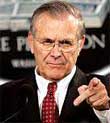 |
 |
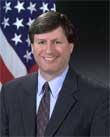 |
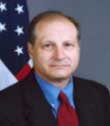 |
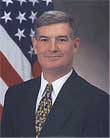 |
Donald Rumsfeld
Secretary of Defense |
Currently Vacant |
Stephen Cambone
Undersecretary for Intelligence |
Eric S. Edelman
Policy Undersecretary |
Kenneth Krieg
Undersecretary for Acquisition, Technology and Logistics |
6 |
7 |
8 |
9 |
10 |
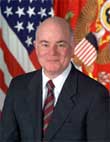 |
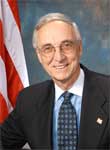 |
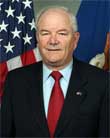 |
|
|
Francis J. Harvey
Secretary of the Army |
Gordon R. England
Secretary of the Navy |
Michael W. Wynne
Secretary of the
Air Force |
Bert
Secretary of Covert Operations |
Ernie
Secretary of Overt Operations |
A little-noticed holiday week executive order from President Bush moved the Pentagon's intelligence chief to the No. 3 spot in the succession hierarchy behind Rumsfeld. The second spot would be the deputy secretary of defense, but that position currently is vacant. The Army secretary, which long held the No. 3 spot, was dropped to sixth.
The changes, announced last week, are the second in six months and reflect the administration's new emphasis on intelligence gathering versus combat in 21st century war fighting.
Technically, the line of succession is assigned to specific positions, rather than the current individuals holding those jobs.
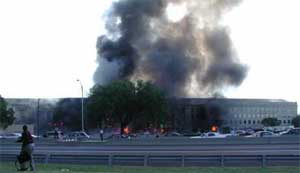 But in its current incarnation, the doomsday plan moves to near the top three undersecretaries who are Rumsfeld loyalists and who previously worked for Vice President Dick Cheney when he was defense secretary. But in its current incarnation, the doomsday plan moves to near the top three undersecretaries who are Rumsfeld loyalists and who previously worked for Vice President Dick Cheney when he was defense secretary.
The changes were recommended, said Pentagon spokesman Bryan Whitman, because the three undersecretaries have "a broad knowledge and perspective of overall Defense Department operations." The service leaders are more focused on training, equipping and leading a particular military service, said Whitman.
Thomas Donnelly, a defense expert with the American Enterprise Institute, said the changes make it easier for the administration to assert political control and could lead to more narrow-minded decisions.
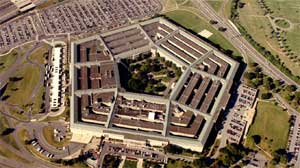 "It continues to devalue the services as institutions," said Donnelly, saying it will centralize power and shift it away from the services, where there is generally more military expertise. "It continues to devalue the services as institutions," said Donnelly, saying it will centralize power and shift it away from the services, where there is generally more military expertise.
Under the new plan, Rumsfeld ally Stephen Cambone, the undersecretary for intelligence, moved up to the third spot. Former Ambassador Eric Edelman, the policy undersecretary, and Kenneth Krieg, the undersecretary for acquisition, technology and logistics, hold the fourth and fifth positions.
The first to succeed Rumsfeld remains the deputy secretary, a position currently vacant because the Senate has not confirmed Bush's nominee - current Navy Secretary Gordon England.
Senators have already approved Donald Winter to be England's replacement as Navy chief, and it is expected that Bush will eventually move England into the No. 2 Pentagon job without congressional approval through a recess appointment.
The new succession order bumps the Navy secretary to near the bottom of the line of succession - seventh behind the deputy, the three Pentagon undersecretaries and the Army and Air Force secretaries.
The Army secretary historically has been third in line, right behind the deputy secretary.
Since the Sept. 11, 2001, terrorist attacks, intelligence gathering has taken center stage. Earlier this year, Bush named former ambassador John Negroponte as the country's first director of national intelligence, charged with overseeing the government's 15 highly competitive spy agencies.
In spring 2003, Rumsfeld installed Cambone - one of his closest aides - in the new job of intelligence undersecretary.
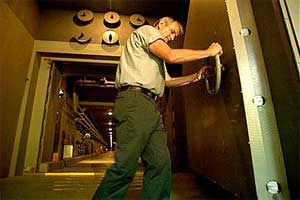
The Presidential line of succession, as specified by the Presidential Succession Act of 1947 (United States Code, Title 3, Section 19) is as follows (current as of December 2005):
Vice President (Richard B. Cheney)
Speaker of the House of Representatives (J. Dennis Hastert)
President pro tempore of the Senate (Ted Stevens)
Secretary of State (Condoleezza Rice)
Secretary of the Treasury (John W. Snow)
Secretary of Defense (Donald H. Rumsfeld)
Attorney General (Alberto Gonzales)
Secretary of the Interior (Gale Norton)
Secretary of Agriculture (Mike Johanns)
Secretary of Commerce (Carlos Gutierrez, ineligible)
Secretary of Labor (Elaine Chao, ineligible)
Secretary of Health and Human Services (Michael Leavitt)
Secretary of Housing and Urban Development (Alphonso Jackson)
Secretary of Transportation (Norman Y. Mineta)
Secretary of Energy (Samuel W. Bodman)
Secretary of Education (Margaret Spellings)
Secretary of Veterans Affairs (Jim Nicholson)
Back
to Main News Page
|